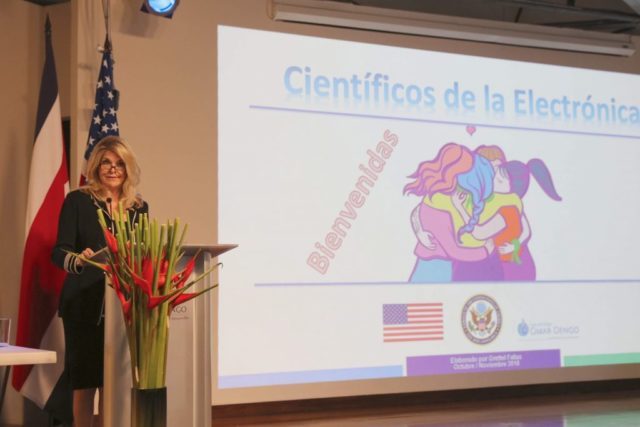Through technological workshops aimed at women between 15 and 20 years old, from vulnerable areas, the Omar Dengo Foundation (FOD) and the United States Embassy seek to encourage interest in scientific areas in this population.
The first of these workshops was held on February 22nd, with a group of 25 young people from the Greater Metropolitan Area (GAM), who received induction on electricity principles in daily tasks and, later, will be able to design their own electrical devices.
On the other hand, in the coming months, the training will be in Guanacaste -the north and south zone- and Limón, in thematic areas of science, computing, physics, design, programming, and robotics.
The initiative called “Women and Technology” is part of the efforts implemented by both entities to contribute to closing the technological gap between men and women. Through the training, young women have the opportunity to demonstrate to themselves that they are capable of performing in these fields traditionally led by men.

“They are learning experiences that favor computational thinking and from which technological scientific products are created that give meaning and understanding of the evolution that the role of people and their creative power is having in the 4th Industrial Revolution. With this, we want to increase the interest for technical or academic vocations in these areas that have greater demand in the country, but that is not necessarily preferred by young women”, explained Leda Muñoz, executive director of the FOD.
By 2015, only 30% of the total graduates in Costa Rica in Science, Technology, Engineering, and Mathematics (STEM) were women, according to data from the UNESCO Institute for Statistics. This percentage was reduced to 24% of the total number of graduates from information and communication technology (ICT) careers only.
The Ambassador of the United States, Sharon Day, indicated that the future of the economy and innovation in Costa Rica requires the participation of young women and programs such as “Women and Technology” to have those skills that will allow them to be successful and solve challenges in an innovative way, create products, and even improve health care.
The workshops use a constructionist methodology through which participants will learn and carry out their projects in a fun, creative and collaborative way while, at the same time, developing skills and knowledge in science, technology, engineering, arts and design, and mathematics.

